Unpaid work and behaviour programmes for convicts have been renationalised by the government in its latest U-turn on the 2014 Transforming Rehabilitation programme.
The controversial reforms, implemented by Chris Grayling, split probation work between the public National Probation Service (NPS) and private companies.
A series of damning reports by parliamentary committees and watchdogs found the restructure put public safety at risk and was “irredeemably flawed”.
Download the new Independent Premium app
Sharing the full story, not just the headlines
In its first climbdown in 2018, the government proposed reducing the number of Community Rehabilitation Companies (CRCs) and reforming their contracts, but then in May last year it announced that the supervision of released prisoners would be renationalised.
Private companies were invited to bid to become “probation delivery partners” for unpaid work and behavioural programmes, such as those for sex offenders and domestic abusers.
But on Thursday, the justice secretary announced the scheme had been scrapped after the coronavirus pandemic caused the government to “reassess” its plans.
“The delivery of unpaid work and behavioural-change programmes will be instead brought under control of the NPS alongside offender supervision when current CRC contracts end in June of next year,” Robert Buckland told MPs.
”This will give us a critical measure of control, resilience and flexibility with these services that we would not have had were they delivered under 12 contracts with a number of organisations.
“We can reassure the judiciary and the public that whatever lies ahead, offenders serving community sentences will be punished and make their reparation to society and that programmes to address their behaviour will be delivered.”
Charities and private companies are still being invited to bid for £100m in annual funding to run other services, such as education, employment, accommodation and addiction treatment.
The latest news on Brexit, politics and beyond direct to your inbox
“The private sector will continue to play a key role in rehabilitating offenders, from specialist support services and operating prisons through to tagging and the job offers they give to those leaving jail,” Mr Buckland said.
About 2,000 staff are expected to be transferred from abolished CRCs to HM Prison and Probation Service when the switchover happens in June next year.


1/50 11 June 2020
Scouts show their support at the Lord Baden-Powell statue in Poole. The statue of Robert Baden-Powell on Poole Quay is to be placed in “safe storage” following concerns about his racial views
Getty

2/50 10 June 2020
Social distancing markers around the penguin enclosure at London Zoo. Staff have been preparing and are now ready for reopening next week with new signage, one-way trails for visitors to follow, and extra handwashing and sanitiser stations in place
PA
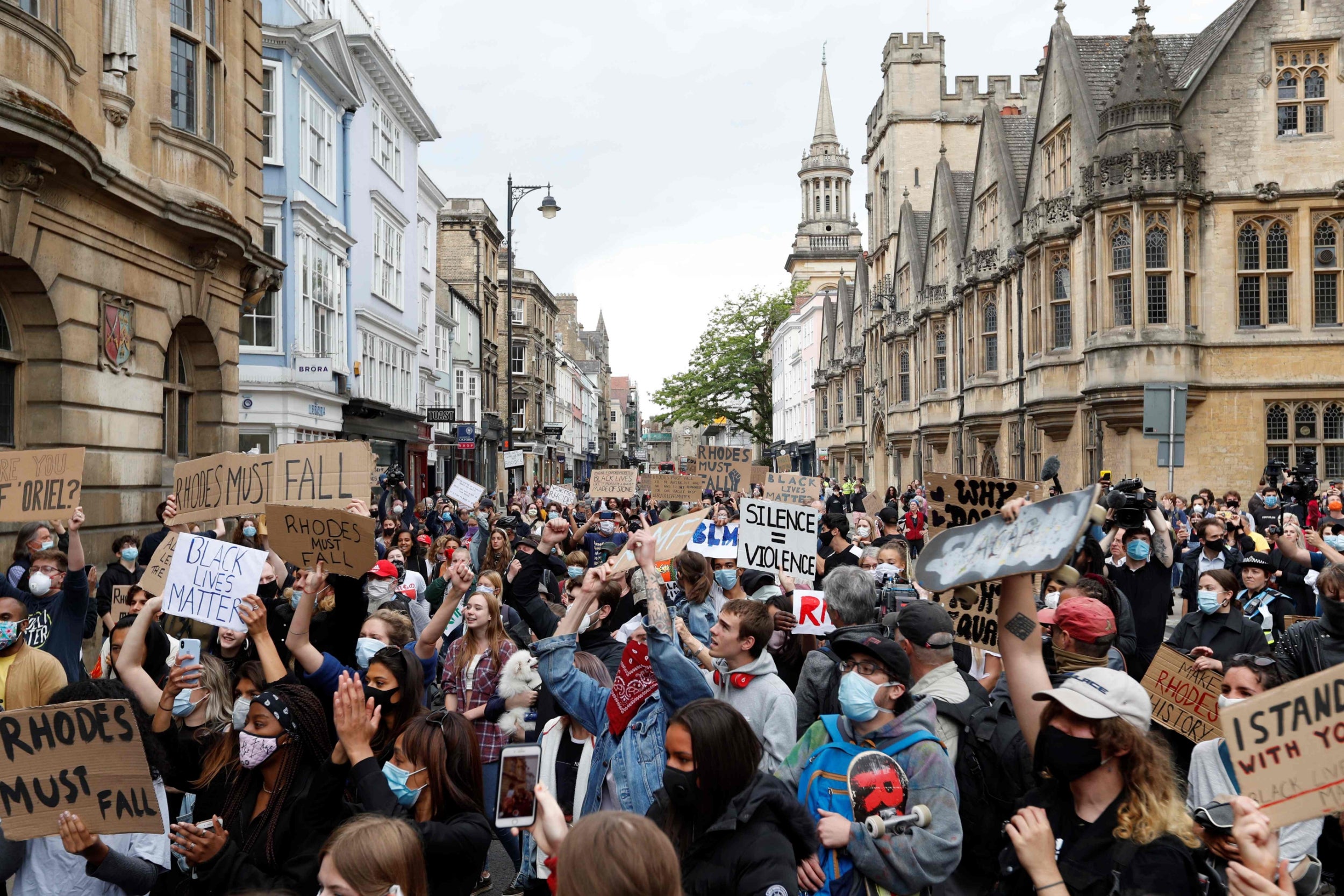
3/50 9 June 2020
Protestors hold placards and shout slogans during during a protest called by the Rhodes Must Fall campaign calling for the removal of the statue of British imperialist Cecil John Rhodes outside Oriel College, at the University of Oxford
AFP via Getty

4/50 8 June 2020
Hermione Wilson helps to install a new artwork at Jupiter Artland, Edinburgh, created as a tribute to the NHS titled “A Thousand Thank Yous” originally devised by the late Allan Kaprow which consists of colourful painted messages on cardboard and has been directed remotely by London-based artist Peter Liversidge
PA

5/50 7 June 2020
The Edward Colston statue has been pulled down by Black Lives Matter protesters in Bristol. Colston was a 17th century slave trader who has numerous landmarks named after him in Bristol
SWNS

6/50 6 June 2020
Children pose for their family in front of discarded placards fixed on a wall in Piccadilly Gardens after a Black Lives Matter demonstrations in Manchester. The death of an African-American man, George Floyd, while in the custody of Minneapolis police has sparked protests across the United States, as well as demonstrations of solidarity in many countries around the world
Getty
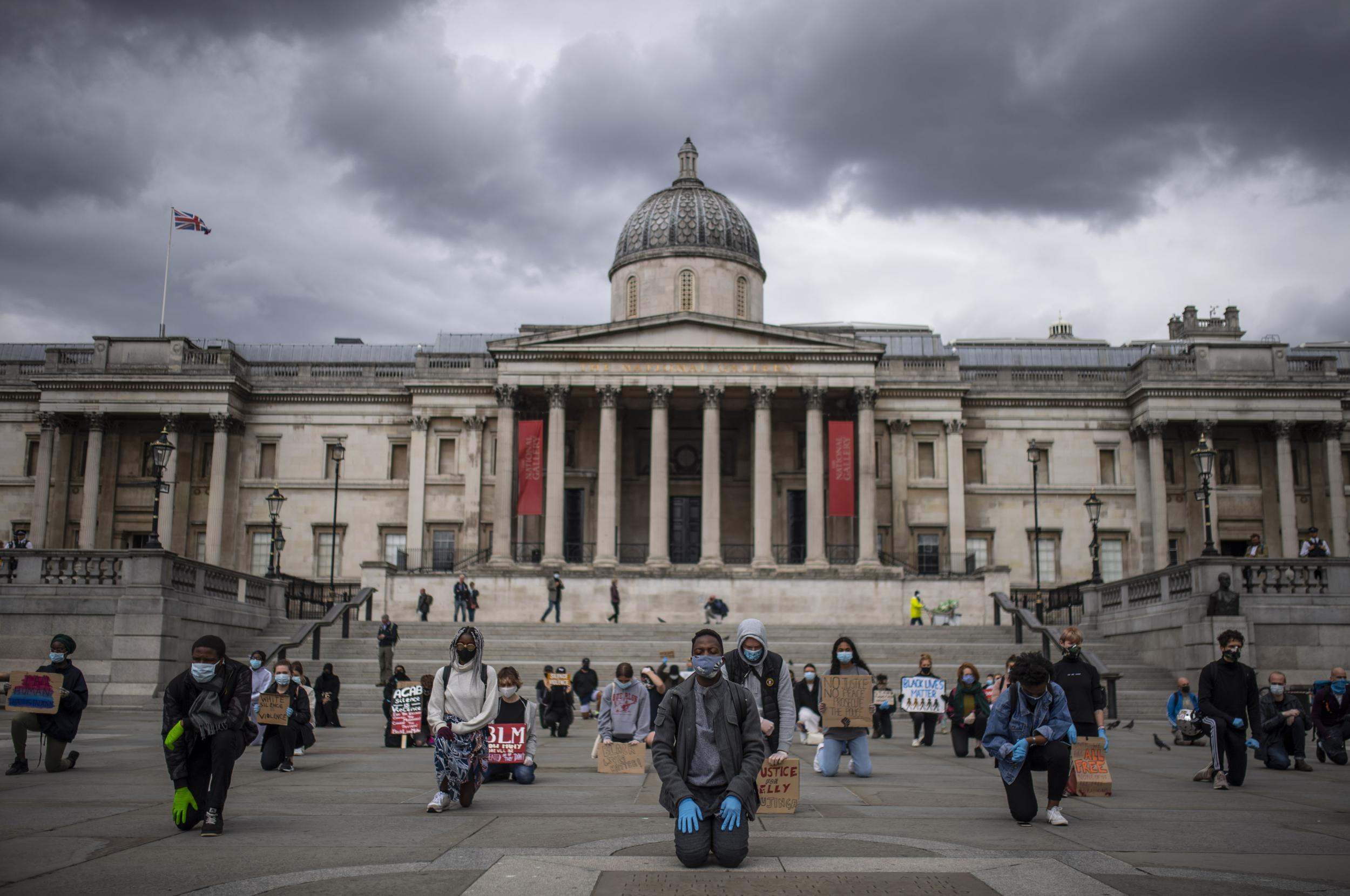
7/50 5 June 2020
Protesters kneel in Trafalgar Square during a Black Lives Matter demonstration in London, England. The death of an African-American man, George Floyd, while in the custody of Minneapolis police has sparked protests across the United States, as well as demonstrations of solidarity in many countries around the world
Getty

8/50 4 June 2020
Protestors march from Windsor Castle in solidarity with the Black Lives Matter movement
Getty
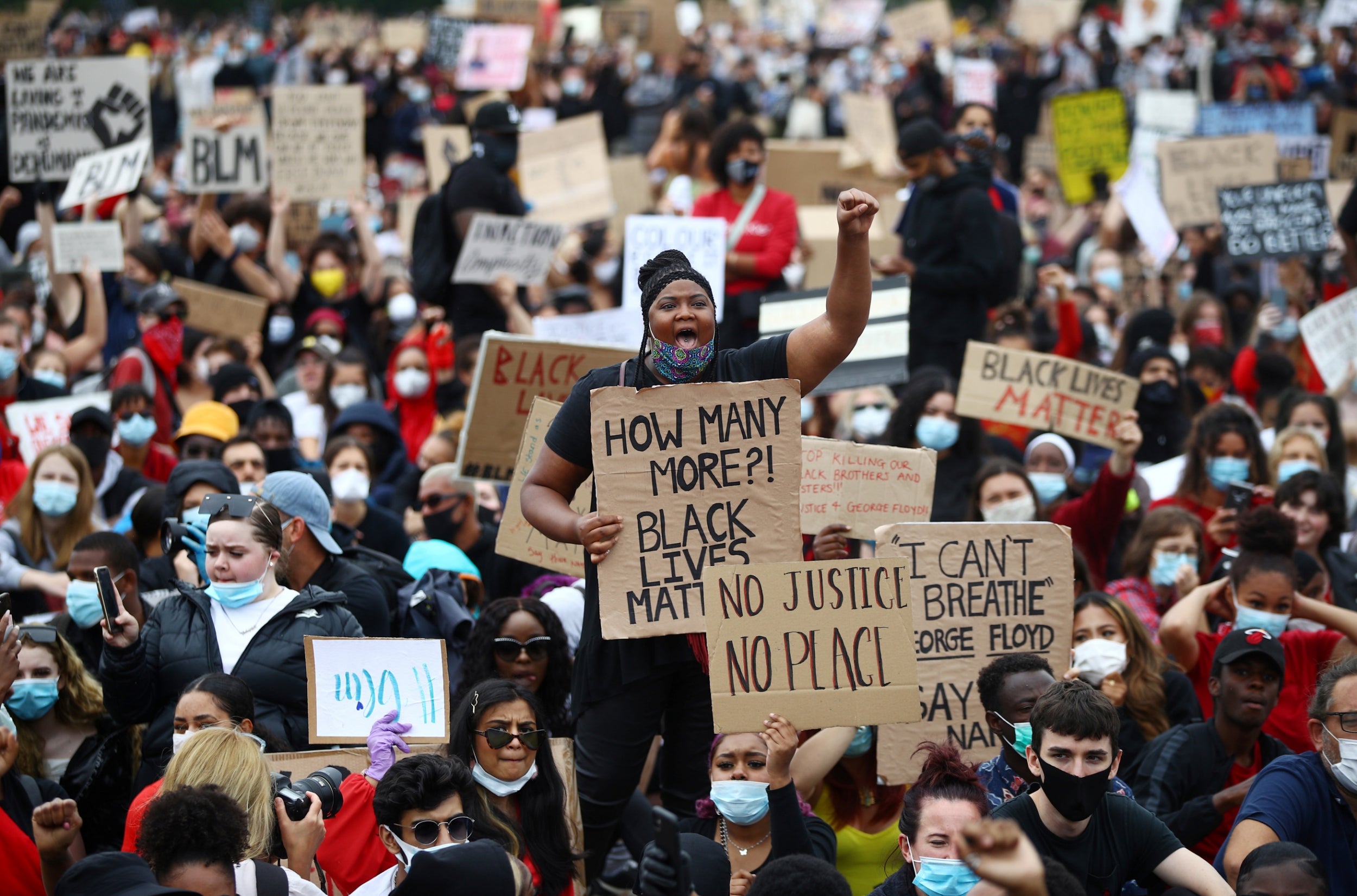
9/50 3 June 2020
People wearing face masks hold banners in Hyde Park during a Black Lives Matter protest following the death of George Floyd who died in police custody in Minneapolis
Reuters

10/50 2 June 2020
Street artist Nath Murdoch touches up his anti-racism mural in Peterborough, Cambridgeshire
PA

11/50 1 June 2020
Customers socially distance themselves as they queue to enter Ikea in Warrington. The store opening saw large queues of people and traffic on adjacent roads as it reopened after the lockdown. The furniture and housewares chain reopened its stores across England and Northern Ireland subject to several restrictions, keeping its restaurants closed and asking customers to shop alone
Getty
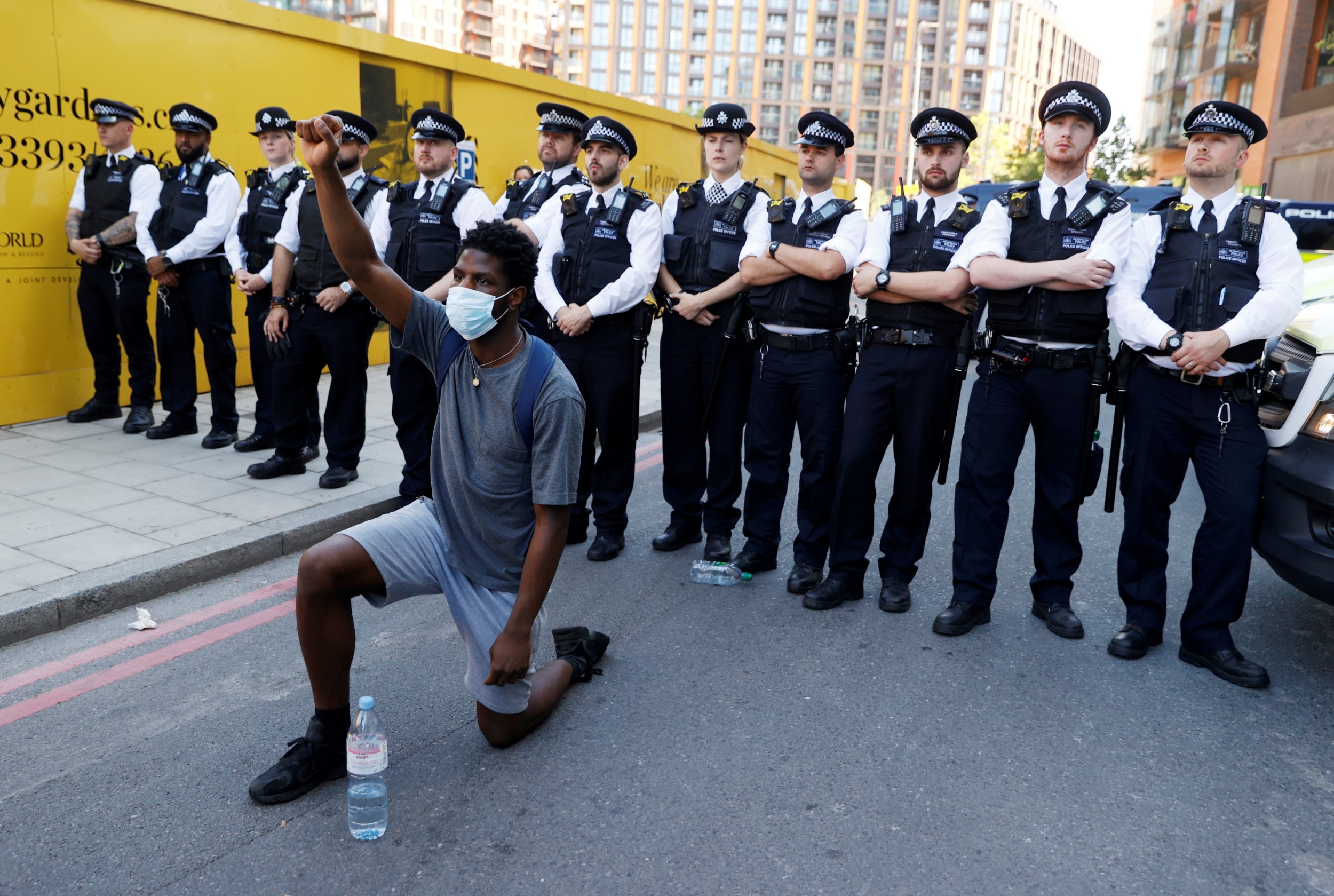
12/50 31 May 2020
A man wearing a protective face mask kneels in front of police officers during a protest against the death in Minneapolis police custody of African-American man George Floyd near the U.S. Embassy, London, Britai
Reuters

13/50 30 May 2020
Visitors at Grassholme Reservoir in Lunedale, Co Durham are able to cross an ancient packhorse bridge as work on the dam wall means water levels have dropped signifcantly to reveal this monument of the pas
UK

14/50 29 May 2020
British Tennis player Maia Lumsden in action at Bridge of Allan Tennis Club. People can meet family and friends outdoors and play sports such as golf and tennis again as the country is moving into phase one of the Scottish Government’s plan for gradually lifting lockdown
PA
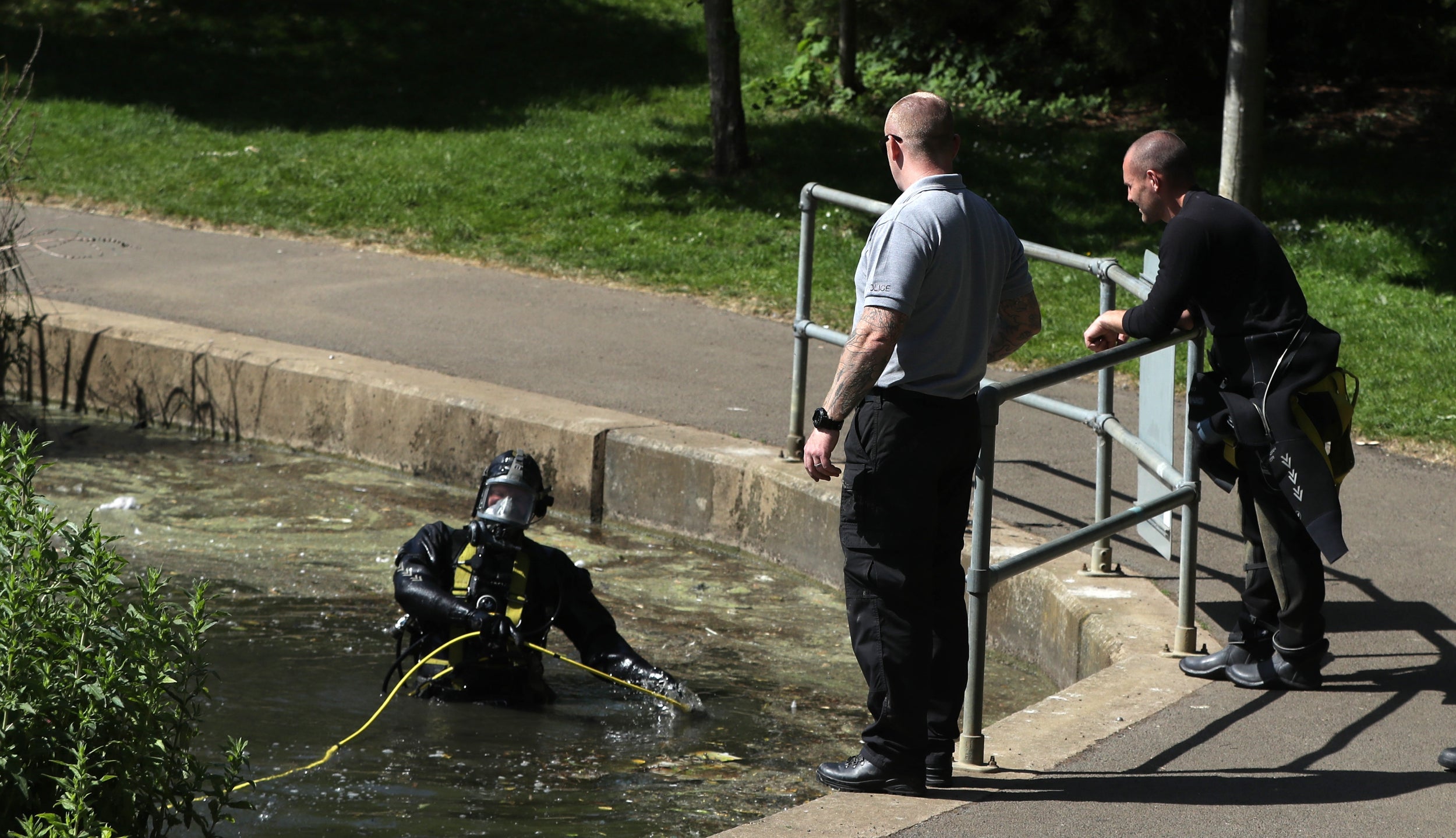
15/50 28 May 2020
A police frogman, searches for a weapon in Abington Lake in in Northampton
Getty
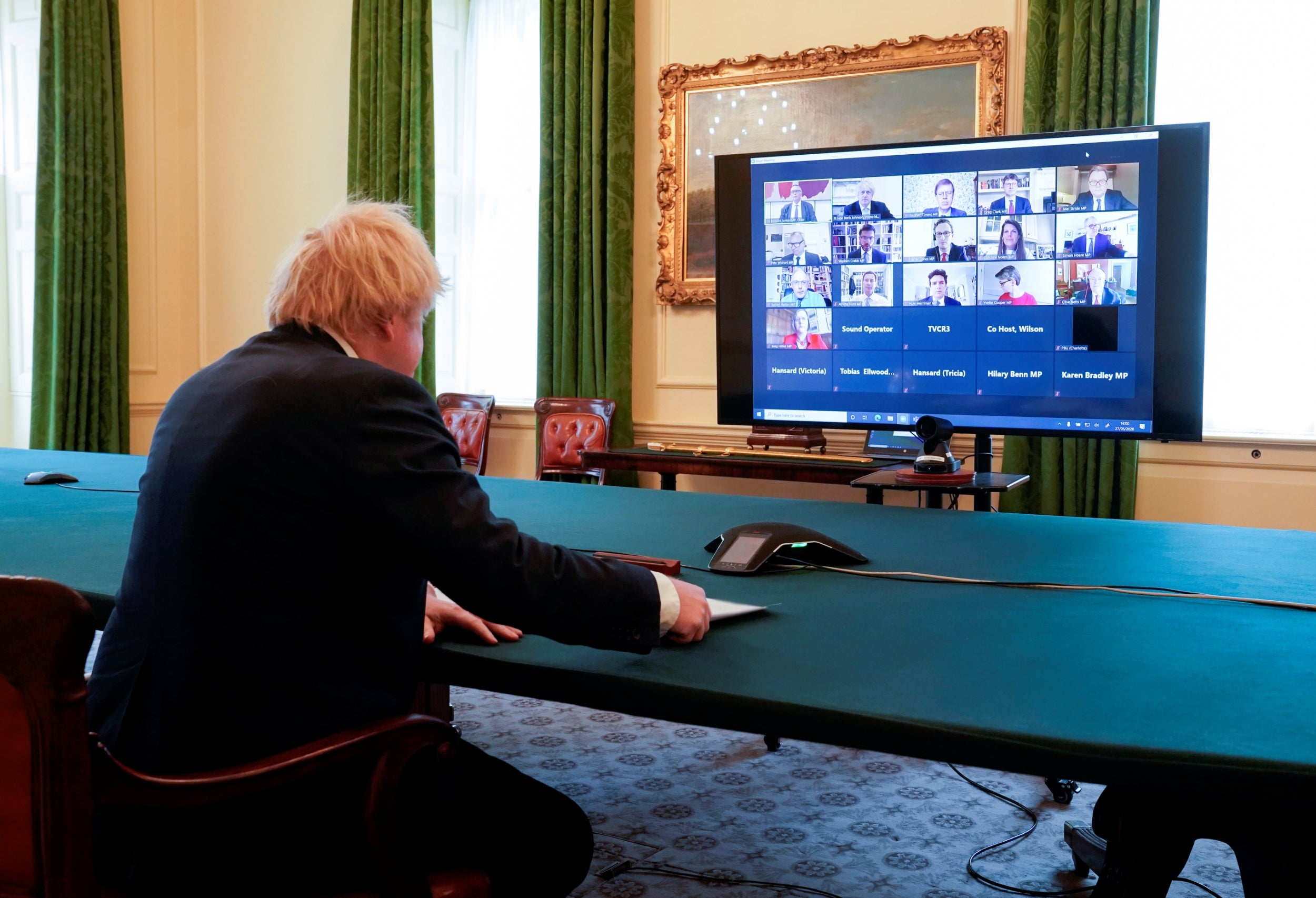
16/50 27 May 2020
Prime Minister Boris Johnson appears before the Liaison Committee via Zoom from the cabinet room at 10 Downing Street, amid the coronavirus
10 Downing Street/Reuters
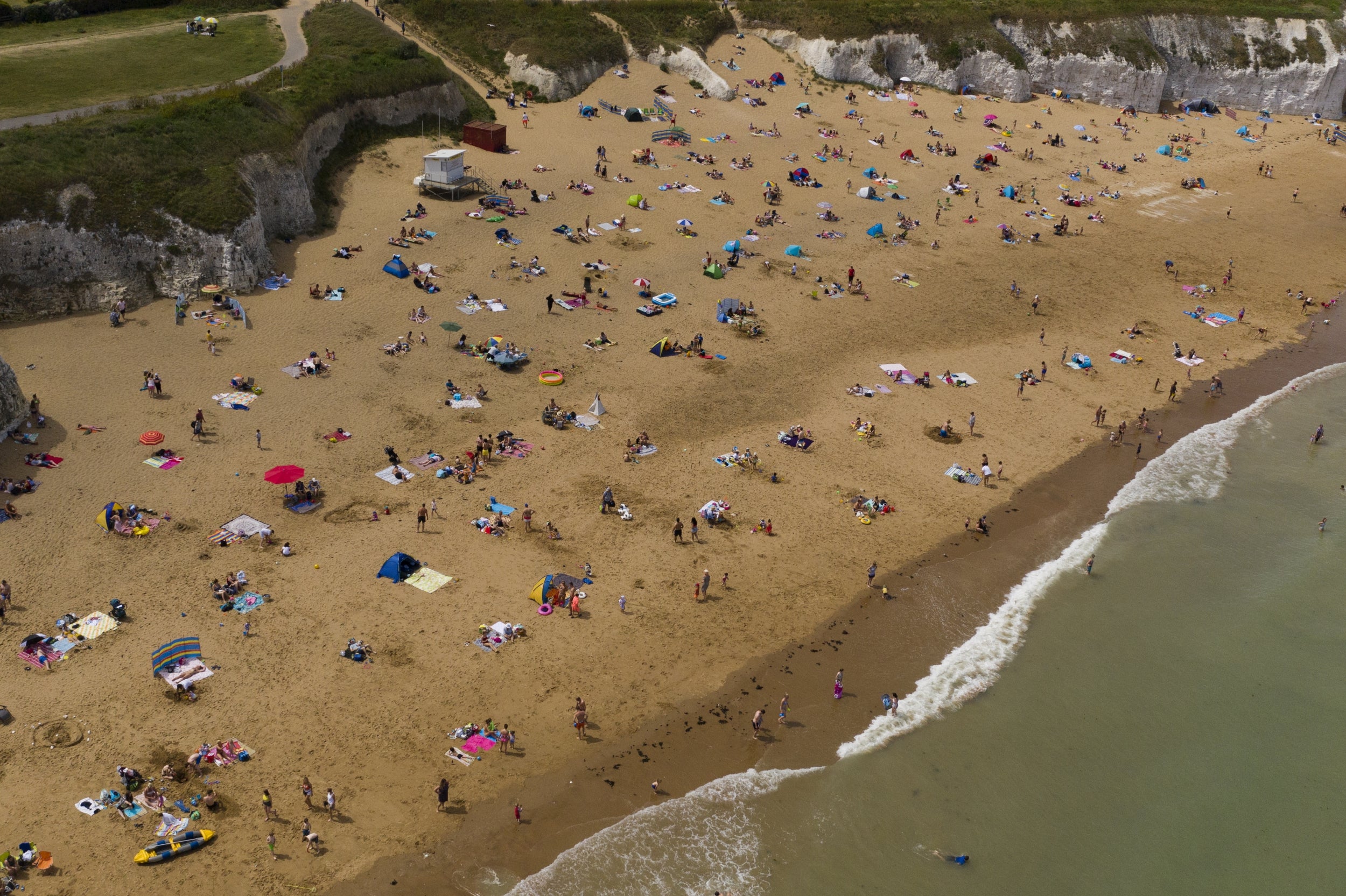
17/50 26 May 2020
Members of the public relax on the beach at Botany Bay in Margate
Getty
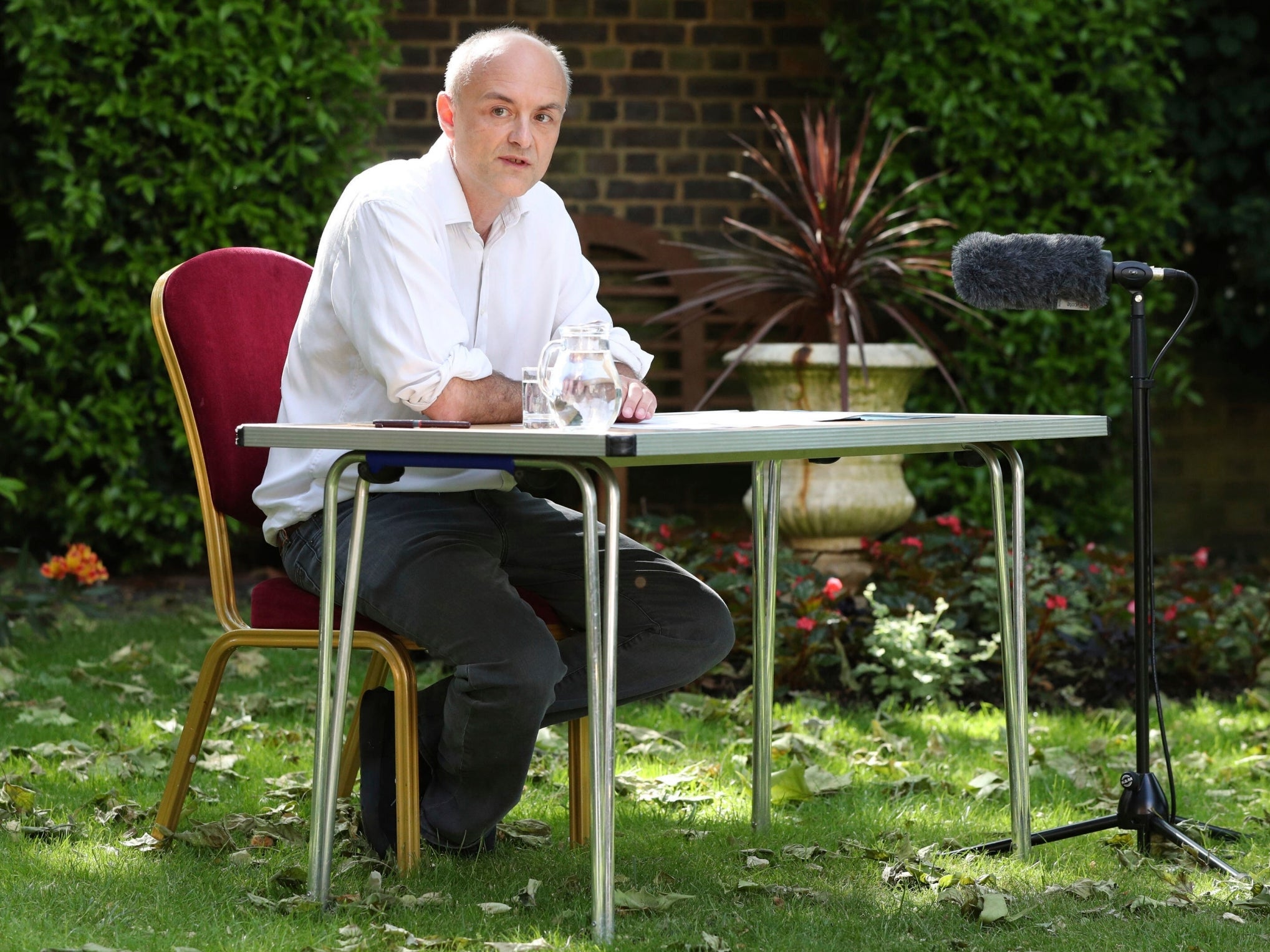
18/50 25 May 2020
Dominic Cummings, senior aide to Prime Minister Boris Johnson, makes a statement inside 10 Downing Street, London, over allegations he breached coronavirus lockdown restrictions
AP
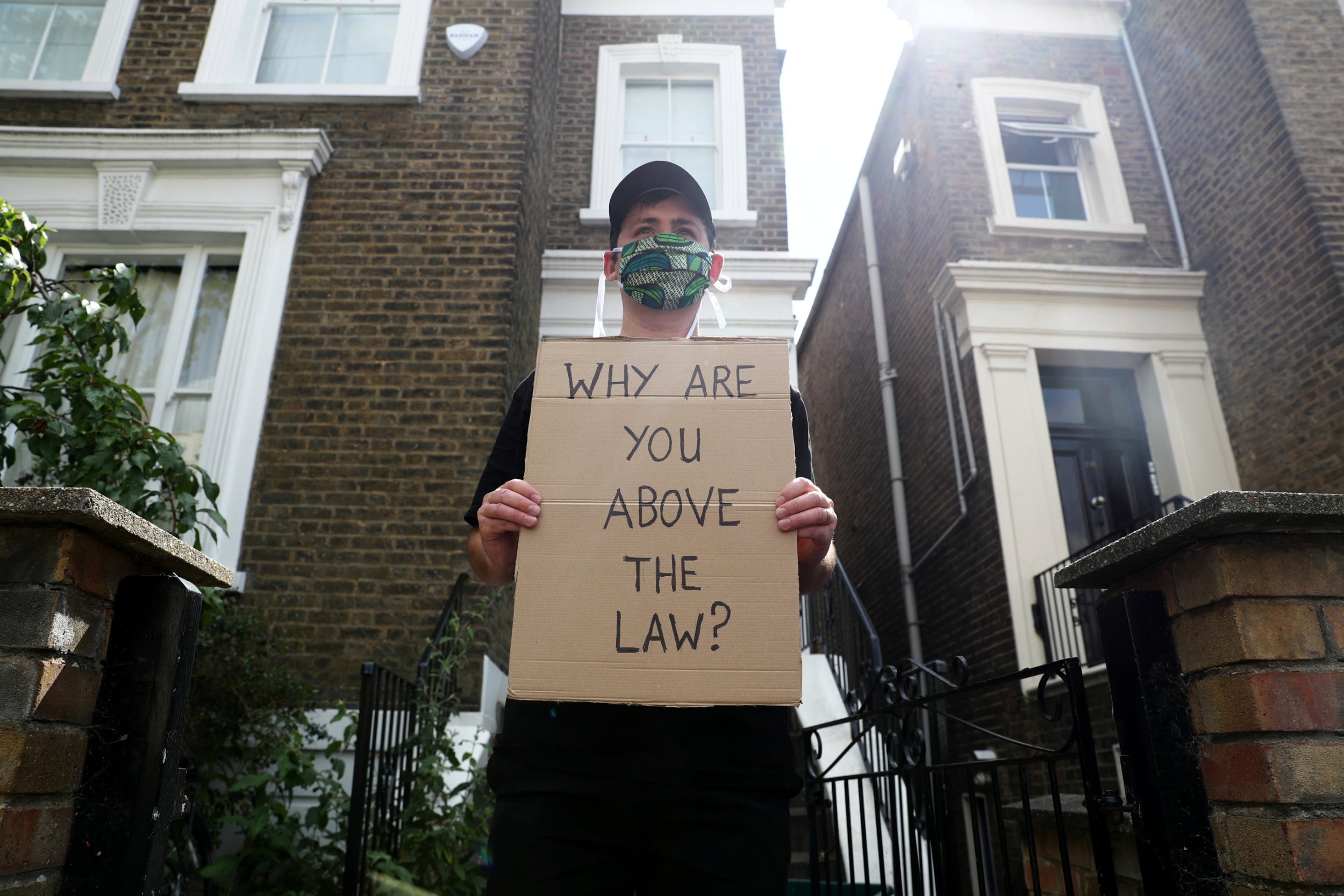
19/50 24 May 2020
A demonstrator holds a sign reading ‘Why are you above the law?’ outside the house of Dominic Cummings in London, following allegations Cummings broke coronavirus lockdown rules by travelling across the country
Reuters

20/50 23 May 2020
People take a walk near Durdle Door as cows graze in Lulworth
Reuters

21/50 22 May 2020
Waves break onto a wall at Brighton beach
Reuters
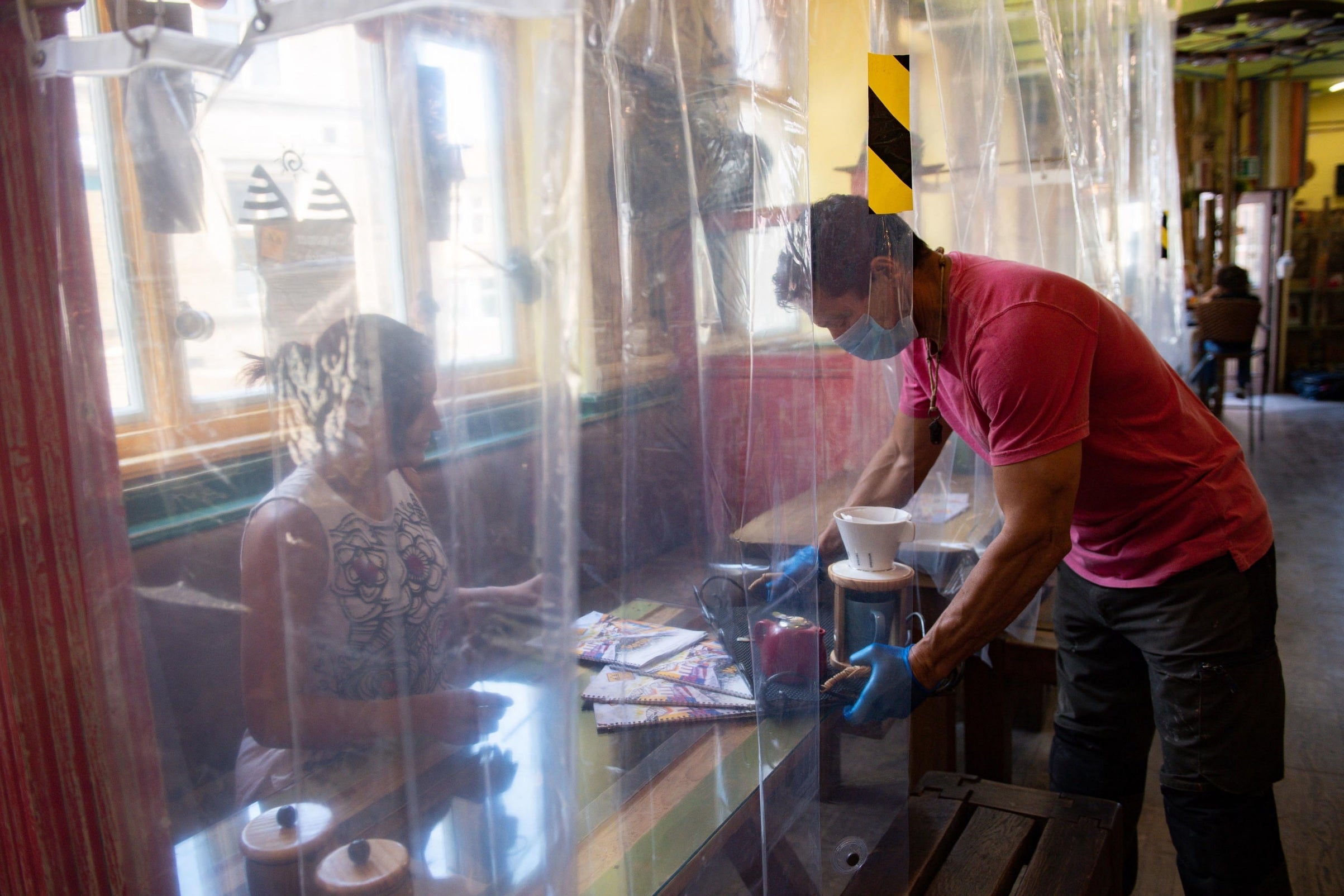
22/50 21 May 2020
Cafe owner Francini Osorio serves customers in a trial phase during the coronavirus lockdown. Osorio has installed an air purifier and 35 clear shower curtains, which will divide customers and tables, in the Francini Cafe De Colombia, Worcester, ready for the re-opening of his business as lockdown restrictions are eased
PA

23/50 20 May 2020
People at Bournemouth beach in Dorset, as people flock to parks and beaches with lockdown measures eased. The Met Office has predicted the hottest day of the year
PA

24/50 19 May 2020
A dog jumps into the water as families relax at a Lido in London
AP

25/50 18 May 2020
A fan celebrates outside Celtic Park after Celtic were crowned champions of the Scottish Premiership. Hearts were also relegated after a decision was made to conclude the season with immediate effect
PA
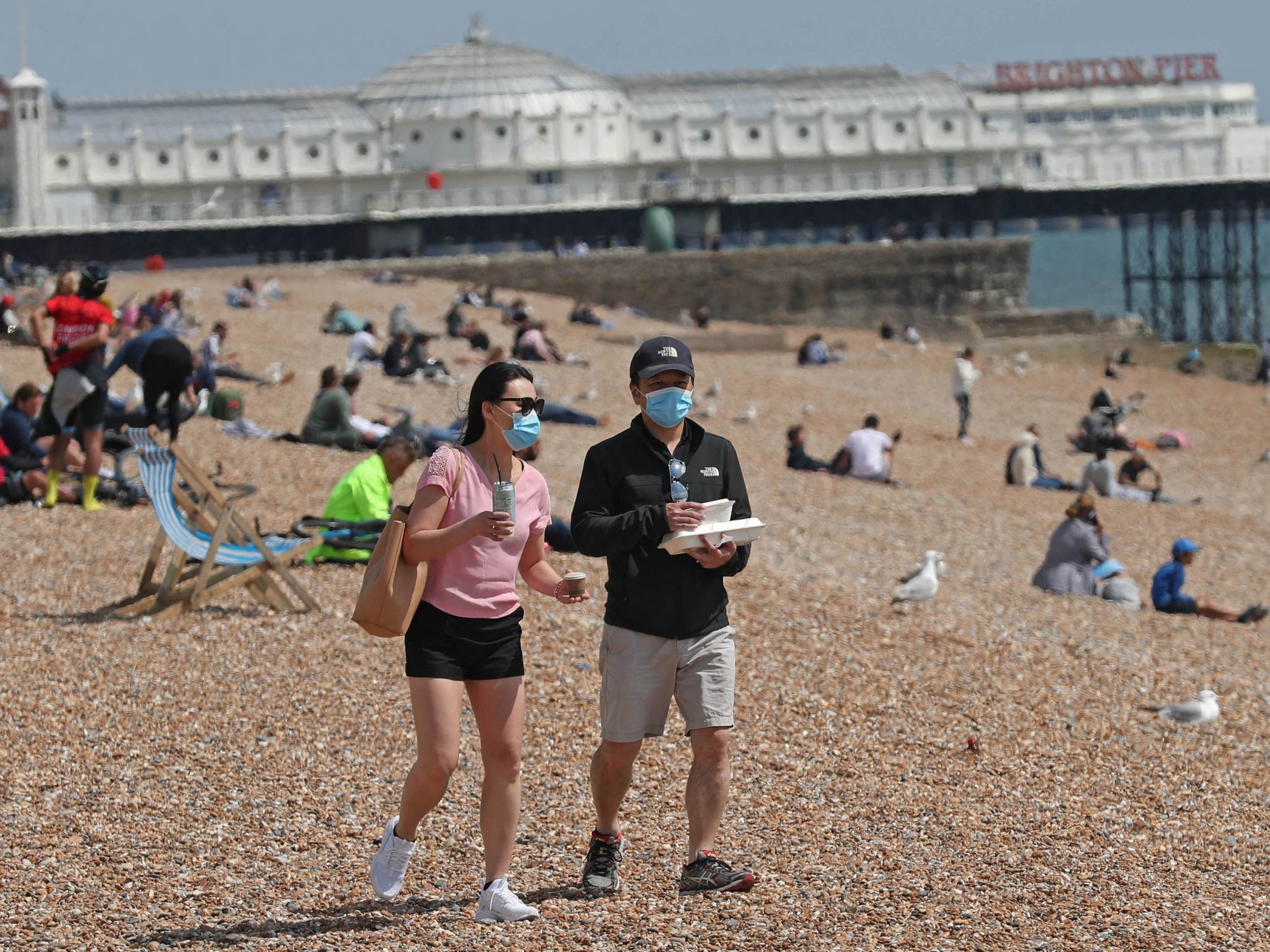
26/50 17 May 2020
People on Brighton beach after the introduction of measures to bring the country out of lockdown
PA

27/50 16 May 2020
Police lead away Piers Corbyn, brother of former Labour leader Jeremy Corbyn, as protesters gather in breach of lockdown rules in Hyde Park in London after the introduction of measures to bring the country out of lockdown.
PA

28/50 15 May 2020
Estonian freelance ballet dancer and choreographer, Eve Mutso performs her daily fitness routine near her home in Glasgow, Scotland
Getty

29/50 14 May 2020
Senior charge nurse Jan Ferguson views artwork “Theatre of Dott’s” by Kate Ive, inspired by Professor Norman Dott and his neurosurgery theatres at the Western General from 1960-2019. It is one of a number of artworks which sit on the walls of NHS Lothians’ Department of Clinical Neurosciences (DCN) which has been transferred into a purpose-built new home on the Little France campus in Edinburgh
PA

30/50 13 May 2020
Team GB’s karate athlete Jordan Thomas trains outside his apartment in Manchester
Reuters

31/50 12 May 2020
Nurses from central London hospitals protest on international nurses day about the chronic underfunding of the NHS and other issues surrounding the health service outside the gates of Downing Street, London
PA

32/50 11 May 2020
Waves crash at Tynemouth pier on the North East coast
PA

33/50 10 May 2020
A woman passes street art and a poster in East London
Reuters
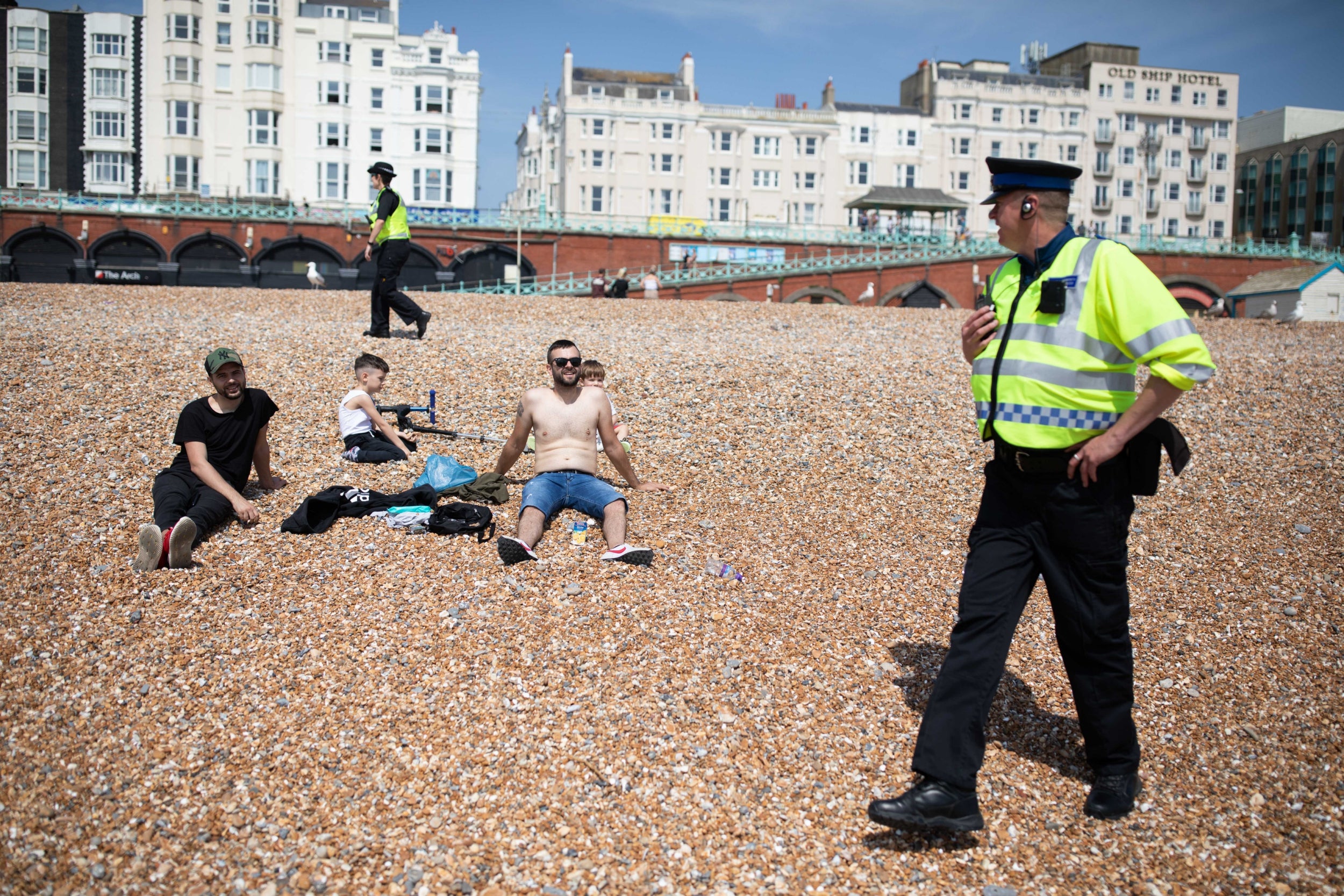
34/50 9 May 2020
Police patrol the beach in Brighton
Getty

35/50 8 May 2020
The British Royal Air Force Red Arrows conduct a fly past over the statue of former British Prime Minister Winston Churchill in London to commemorate the 75th Anniversary of Victory in Europe (VE Day) in Britain
MOD/Reuters

36/50 7 May 2020
Team GB sailor Eilidh McIntyre during a training session at her home in Portsmouth
Reuters
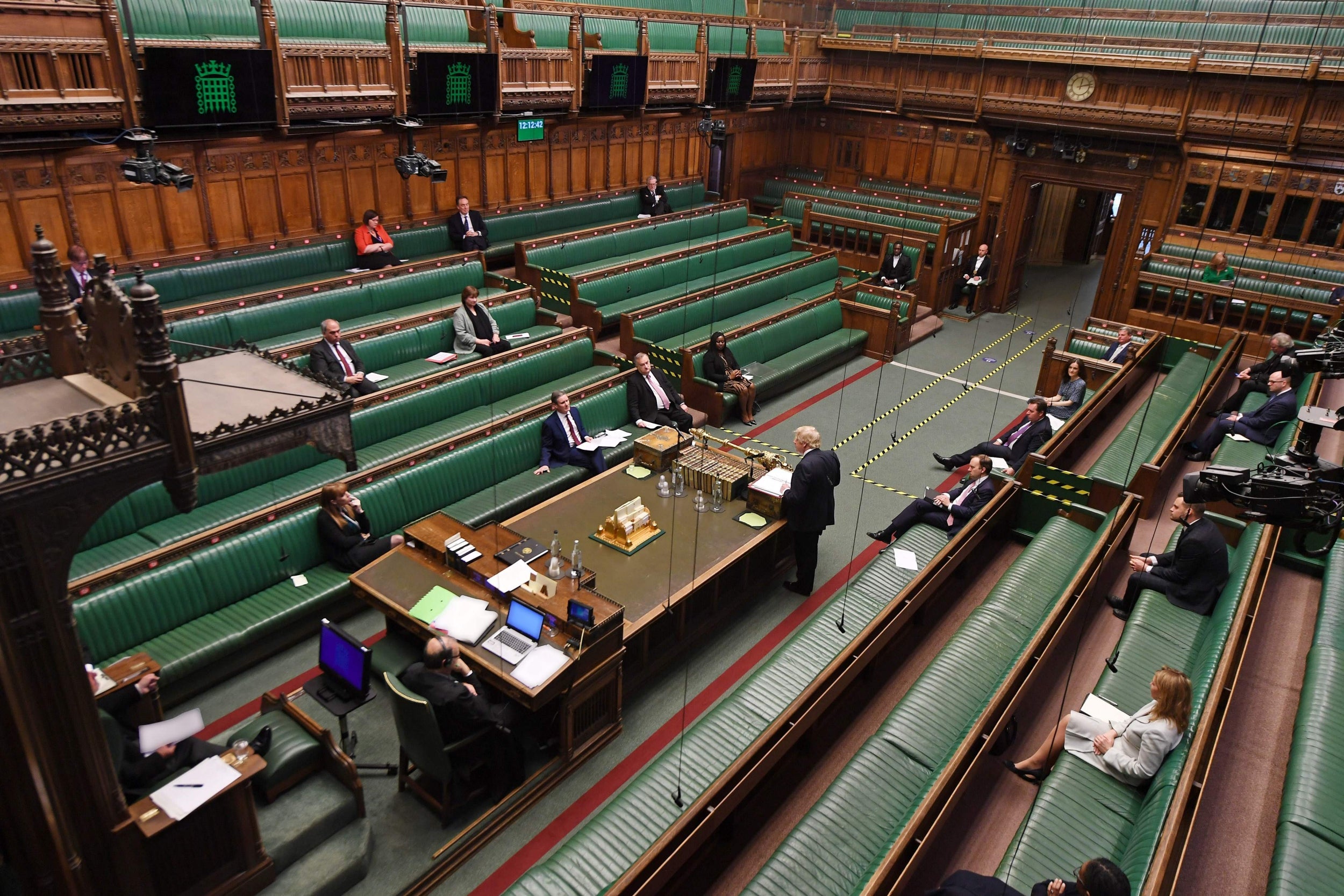
37/50 6 May 2020
Labour Party leader Keir Starmer listens to Prime Minister Boris Johnson speaking during PMQs
UK Parliament/AFP/Getty

38/50 5 May 2020
The sun appears to explode over the horizon in this montage of images captured by photographer Nick Lucas near his home in Ringwood, Hampshire. Nick took a number of pictures just a few seconds apart on a tripod mounted camera which were then combined to give the eye catching dawn image
Nick Lucas/SWNS

39/50 4 May 2020
Leeds Green Watch firefighters observe a minute’s silence outside the fire station in Kirkstall Rd, in memory their colleagues that lost their lives in the line of duty
PA

40/50 3 May 2020
Staff at The Berkeley hotel give food to ambulance workers
Reuters
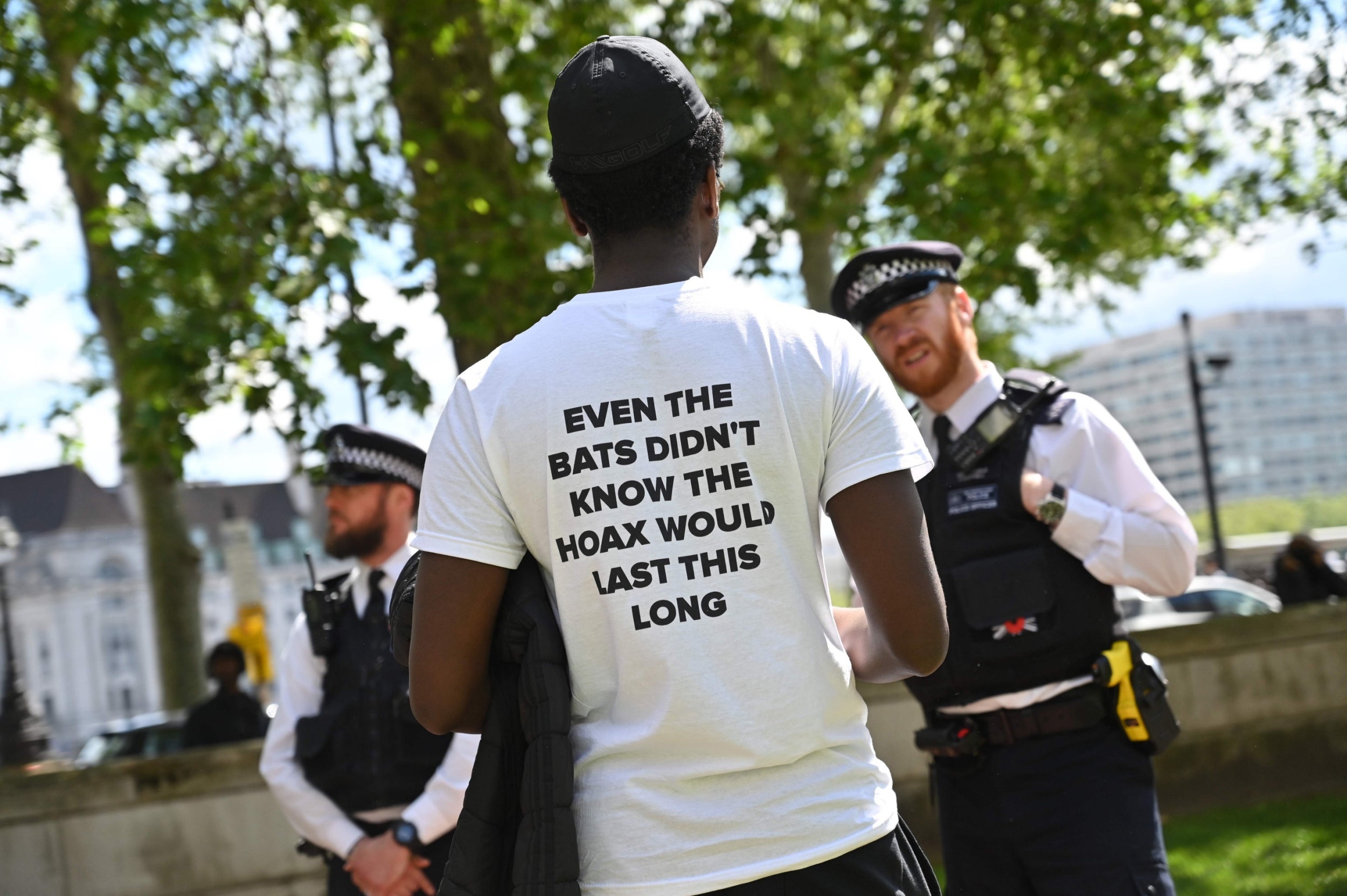
41/50 2 May 2020
One of a small group of anti-lockdown protesters speaks to a police officer as they gather outside New Scotland Yard in Victoria, London
AFP via Getty

42/50 1 May 2020
Bonnie the Llama grazes in a field in the Scottish Borders alongside a sign supporting the NHS as the UK continues in lockdown
PA
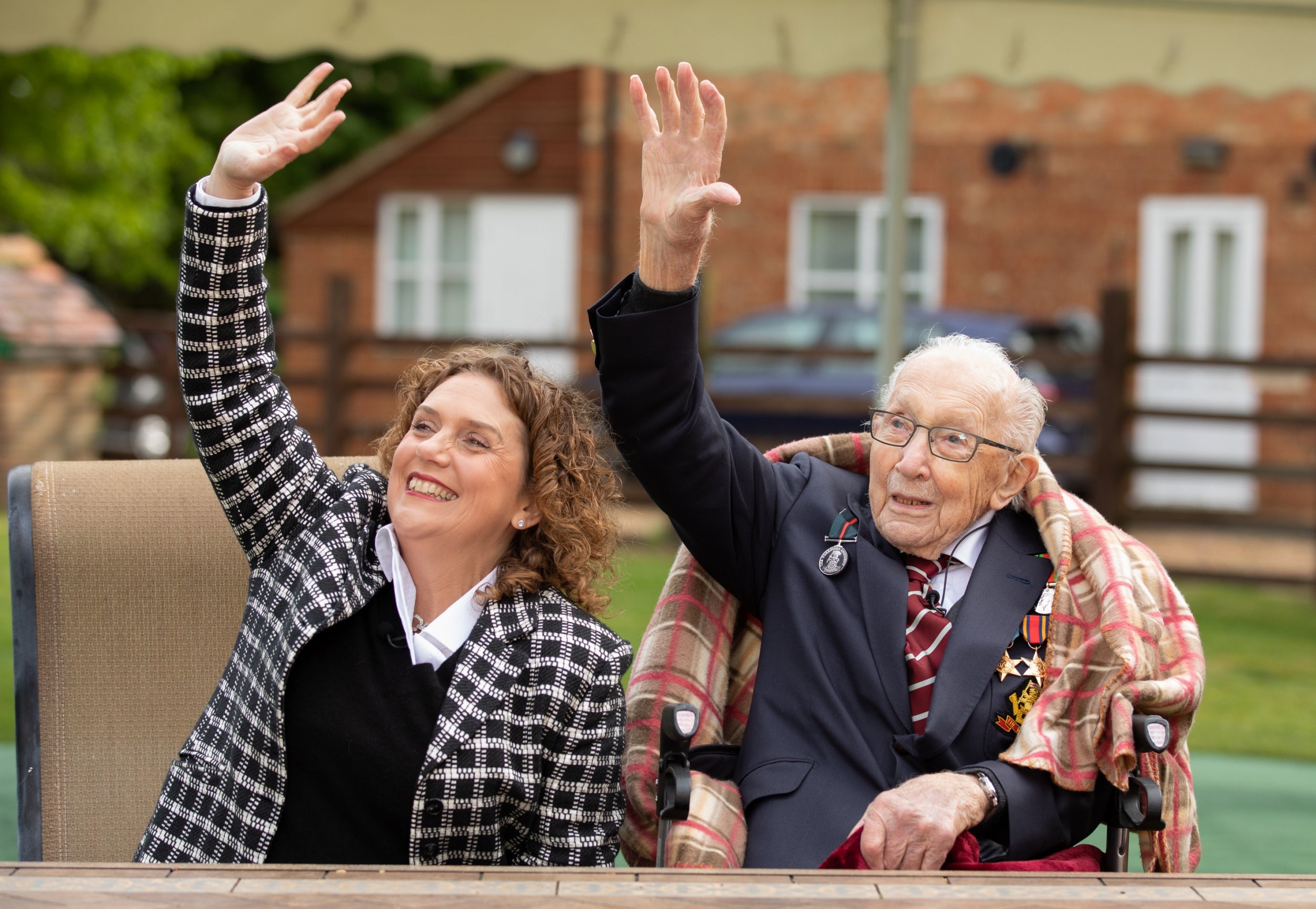
43/50 30 April 2020
Colonel Tom Moore and his daughter Hannah celebrate his 100th birthday, with an RAF flypast provided by a Spitfire and a Hurricane over his home in Marston Moretaine. Colonel Moore, formerly a Captain, received a promotion in honour of his birthday and in recognition of the funds, in excess of £30m, he raised for the NHS by walking laps of his garden
Capture the Light Photography/Getty
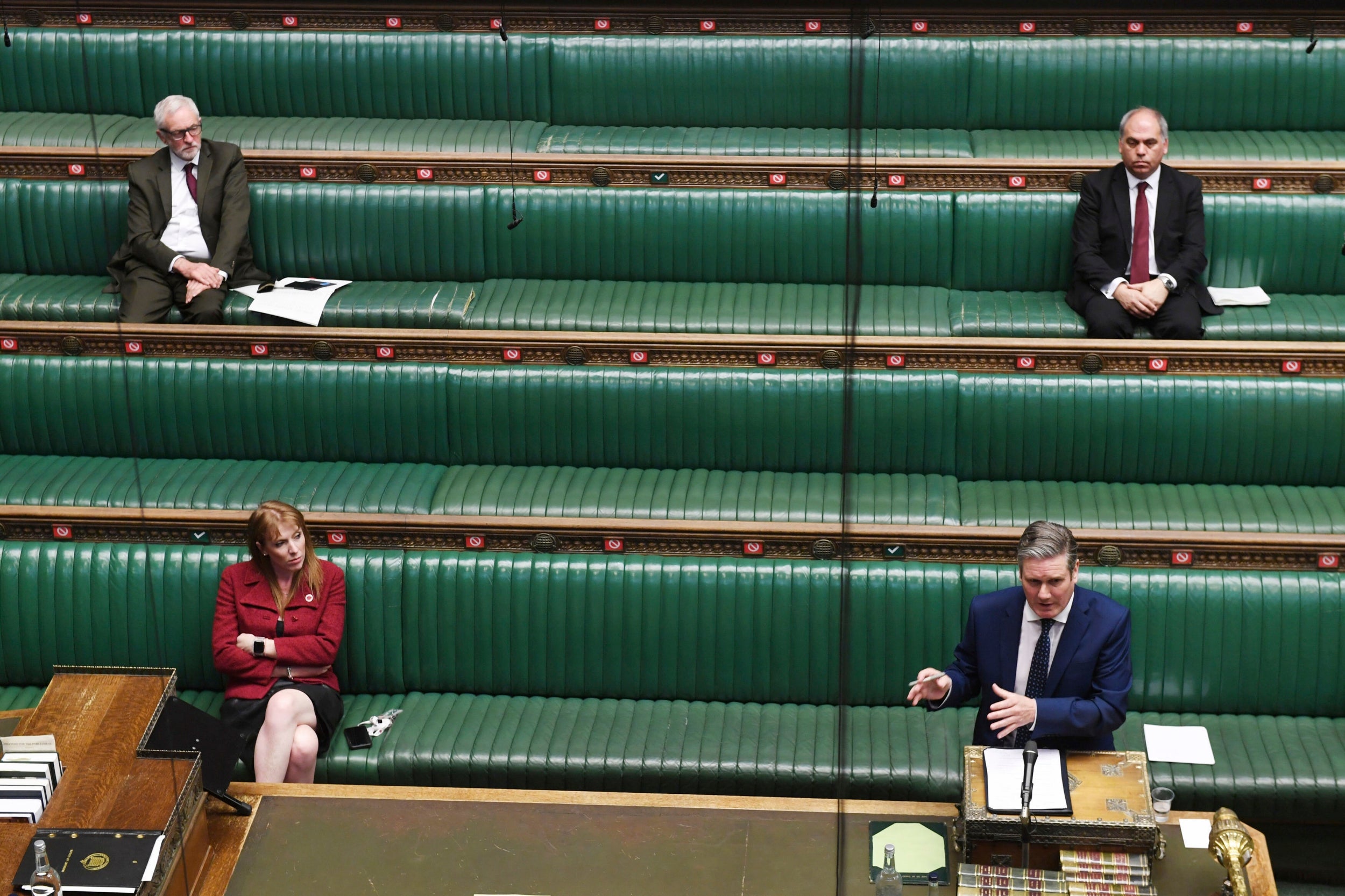
44/50 29 April 2020
Britain’s Labour leader Keir Starmer speaks during Prime Minister’s Questions, as members of Parliament observe social distancing due to the coronavirus, in the House of Commons, London, Wednesday, April 29, 2020
UK Parliament/AP
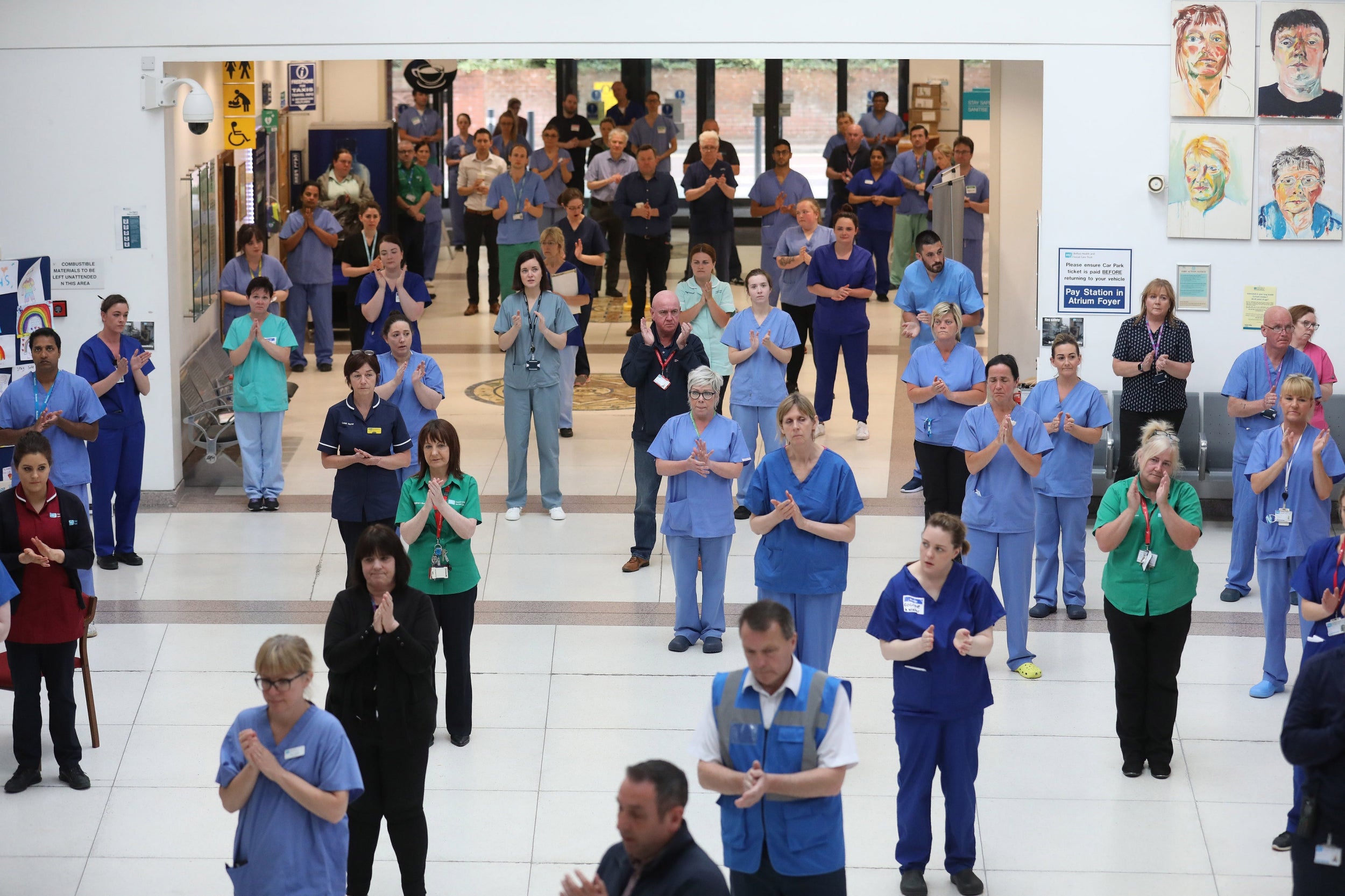
45/50 28 April 2020
NHS staff at the Mater hospital in Belfast, during a minute’s silence to pay tribute to the NHS staff and key workers who have died during the coronavirus outbreak
PA

46/50 27 April 2020
The sun rises behind redundant oil platforms moored in the Firth of Forth near Kirkcaldy, Fife. Global oil prices have crashed after the coronavirus pandemic reduced demand, with analysts warning that the oil majors may be looking at one of their biggest quarter-on-quarter profitability hits in history.
PA

47/50 26 April 2020
Frankie Lynch celebrates on the Mall where the finish of the London Marathon was due to take place today after running 2.6 miles instead of 26 miles to raise money for The Running Charity
Reuters

48/50 25 April 2020
A muslim woman walks past balloons outside the National Hospital for Neurology and Neurosurgery in London
Reuters

49/50 24 April 2020
An empty Brighton Pier, closed during the Coronavirus pandemic as temperatures reach 20 degrees in the South East
Rex

50/50 23 April 2020
Farmers work with vehicles to prepare a field next to a field of flowering rapeseed near Pontefract, West Yorkshire
AFP/Getty

1/50 11 June 2020
Scouts show their support at the Lord Baden-Powell statue in Poole. The statue of Robert Baden-Powell on Poole Quay is to be placed in “safe storage” following concerns about his racial views
Getty

2/50 10 June 2020
Social distancing markers around the penguin enclosure at London Zoo. Staff have been preparing and are now ready for reopening next week with new signage, one-way trails for visitors to follow, and extra handwashing and sanitiser stations in place
PA

3/50 9 June 2020
Protestors hold placards and shout slogans during during a protest called by the Rhodes Must Fall campaign calling for the removal of the statue of British imperialist Cecil John Rhodes outside Oriel College, at the University of Oxford
AFP via Getty

4/50 8 June 2020
Hermione Wilson helps to install a new artwork at Jupiter Artland, Edinburgh, created as a tribute to the NHS titled “A Thousand Thank Yous” originally devised by the late Allan Kaprow which consists of colourful painted messages on cardboard and has been directed remotely by London-based artist Peter Liversidge
PA

5/50 7 June 2020
The Edward Colston statue has been pulled down by Black Lives Matter protesters in Bristol. Colston was a 17th century slave trader who has numerous landmarks named after him in Bristol
SWNS

6/50 6 June 2020
Children pose for their family in front of discarded placards fixed on a wall in Piccadilly Gardens after a Black Lives Matter demonstrations in Manchester. The death of an African-American man, George Floyd, while in the custody of Minneapolis police has sparked protests across the United States, as well as demonstrations of solidarity in many countries around the world
Getty

7/50 5 June 2020
Protesters kneel in Trafalgar Square during a Black Lives Matter demonstration in London, England. The death of an African-American man, George Floyd, while in the custody of Minneapolis police has sparked protests across the United States, as well as demonstrations of solidarity in many countries around the world
Getty

8/50 4 June 2020
Protestors march from Windsor Castle in solidarity with the Black Lives Matter movement
Getty

9/50 3 June 2020
People wearing face masks hold banners in Hyde Park during a Black Lives Matter protest following the death of George Floyd who died in police custody in Minneapolis
Reuters

10/50 2 June 2020
Street artist Nath Murdoch touches up his anti-racism mural in Peterborough, Cambridgeshire
PA

11/50 1 June 2020
Customers socially distance themselves as they queue to enter Ikea in Warrington. The store opening saw large queues of people and traffic on adjacent roads as it reopened after the lockdown. The furniture and housewares chain reopened its stores across England and Northern Ireland subject to several restrictions, keeping its restaurants closed and asking customers to shop alone
Getty

12/50 31 May 2020
A man wearing a protective face mask kneels in front of police officers during a protest against the death in Minneapolis police custody of African-American man George Floyd near the U.S. Embassy, London, Britai
Reuters

13/50 30 May 2020
Visitors at Grassholme Reservoir in Lunedale, Co Durham are able to cross an ancient packhorse bridge as work on the dam wall means water levels have dropped signifcantly to reveal this monument of the pas
UK

14/50 29 May 2020
British Tennis player Maia Lumsden in action at Bridge of Allan Tennis Club. People can meet family and friends outdoors and play sports such as golf and tennis again as the country is moving into phase one of the Scottish Government’s plan for gradually lifting lockdown
PA

15/50 28 May 2020
A police frogman, searches for a weapon in Abington Lake in in Northampton
Getty

16/50 27 May 2020
Prime Minister Boris Johnson appears before the Liaison Committee via Zoom from the cabinet room at 10 Downing Street, amid the coronavirus
10 Downing Street/Reuters

17/50 26 May 2020
Members of the public relax on the beach at Botany Bay in Margate
Getty

18/50 25 May 2020
Dominic Cummings, senior aide to Prime Minister Boris Johnson, makes a statement inside 10 Downing Street, London, over allegations he breached coronavirus lockdown restrictions
AP

19/50 24 May 2020
A demonstrator holds a sign reading ‘Why are you above the law?’ outside the house of Dominic Cummings in London, following allegations Cummings broke coronavirus lockdown rules by travelling across the country
Reuters

20/50 23 May 2020
People take a walk near Durdle Door as cows graze in Lulworth
Reuters

21/50 22 May 2020
Waves break onto a wall at Brighton beach
Reuters

22/50 21 May 2020
Cafe owner Francini Osorio serves customers in a trial phase during the coronavirus lockdown. Osorio has installed an air purifier and 35 clear shower curtains, which will divide customers and tables, in the Francini Cafe De Colombia, Worcester, ready for the re-opening of his business as lockdown restrictions are eased
PA

23/50 20 May 2020
People at Bournemouth beach in Dorset, as people flock to parks and beaches with lockdown measures eased. The Met Office has predicted the hottest day of the year
PA

24/50 19 May 2020
A dog jumps into the water as families relax at a Lido in London
AP

25/50 18 May 2020
A fan celebrates outside Celtic Park after Celtic were crowned champions of the Scottish Premiership. Hearts were also relegated after a decision was made to conclude the season with immediate effect
PA

26/50 17 May 2020
People on Brighton beach after the introduction of measures to bring the country out of lockdown
PA

27/50 16 May 2020
Police lead away Piers Corbyn, brother of former Labour leader Jeremy Corbyn, as protesters gather in breach of lockdown rules in Hyde Park in London after the introduction of measures to bring the country out of lockdown.
PA

28/50 15 May 2020
Estonian freelance ballet dancer and choreographer, Eve Mutso performs her daily fitness routine near her home in Glasgow, Scotland
Getty

29/50 14 May 2020
Senior charge nurse Jan Ferguson views artwork “Theatre of Dott’s” by Kate Ive, inspired by Professor Norman Dott and his neurosurgery theatres at the Western General from 1960-2019. It is one of a number of artworks which sit on the walls of NHS Lothians’ Department of Clinical Neurosciences (DCN) which has been transferred into a purpose-built new home on the Little France campus in Edinburgh
PA

30/50 13 May 2020
Team GB’s karate athlete Jordan Thomas trains outside his apartment in Manchester
Reuters

31/50 12 May 2020
Nurses from central London hospitals protest on international nurses day about the chronic underfunding of the NHS and other issues surrounding the health service outside the gates of Downing Street, London
PA

32/50 11 May 2020
Waves crash at Tynemouth pier on the North East coast
PA

33/50 10 May 2020
A woman passes street art and a poster in East London
Reuters

34/50 9 May 2020
Police patrol the beach in Brighton
Getty

35/50 8 May 2020
The British Royal Air Force Red Arrows conduct a fly past over the statue of former British Prime Minister Winston Churchill in London to commemorate the 75th Anniversary of Victory in Europe (VE Day) in Britain
MOD/Reuters

36/50 7 May 2020
Team GB sailor Eilidh McIntyre during a training session at her home in Portsmouth
Reuters

37/50 6 May 2020
Labour Party leader Keir Starmer listens to Prime Minister Boris Johnson speaking during PMQs
UK Parliament/AFP/Getty

38/50 5 May 2020
The sun appears to explode over the horizon in this montage of images captured by photographer Nick Lucas near his home in Ringwood, Hampshire. Nick took a number of pictures just a few seconds apart on a tripod mounted camera which were then combined to give the eye catching dawn image
Nick Lucas/SWNS

39/50 4 May 2020
Leeds Green Watch firefighters observe a minute’s silence outside the fire station in Kirkstall Rd, in memory their colleagues that lost their lives in the line of duty
PA

40/50 3 May 2020
Staff at The Berkeley hotel give food to ambulance workers
Reuters

41/50 2 May 2020
One of a small group of anti-lockdown protesters speaks to a police officer as they gather outside New Scotland Yard in Victoria, London
AFP via Getty

42/50 1 May 2020
Bonnie the Llama grazes in a field in the Scottish Borders alongside a sign supporting the NHS as the UK continues in lockdown
PA

43/50 30 April 2020
Colonel Tom Moore and his daughter Hannah celebrate his 100th birthday, with an RAF flypast provided by a Spitfire and a Hurricane over his home in Marston Moretaine. Colonel Moore, formerly a Captain, received a promotion in honour of his birthday and in recognition of the funds, in excess of £30m, he raised for the NHS by walking laps of his garden
Capture the Light Photography/Getty

44/50 29 April 2020
Britain’s Labour leader Keir Starmer speaks during Prime Minister’s Questions, as members of Parliament observe social distancing due to the coronavirus, in the House of Commons, London, Wednesday, April 29, 2020
UK Parliament/AP

45/50 28 April 2020
NHS staff at the Mater hospital in Belfast, during a minute’s silence to pay tribute to the NHS staff and key workers who have died during the coronavirus outbreak
PA

46/50 27 April 2020
The sun rises behind redundant oil platforms moored in the Firth of Forth near Kirkcaldy, Fife. Global oil prices have crashed after the coronavirus pandemic reduced demand, with analysts warning that the oil majors may be looking at one of their biggest quarter-on-quarter profitability hits in history.
PA

47/50 26 April 2020
Frankie Lynch celebrates on the Mall where the finish of the London Marathon was due to take place today after running 2.6 miles instead of 26 miles to raise money for The Running Charity
Reuters

48/50 25 April 2020
A muslim woman walks past balloons outside the National Hospital for Neurology and Neurosurgery in London
Reuters

49/50 24 April 2020
An empty Brighton Pier, closed during the Coronavirus pandemic as temperatures reach 20 degrees in the South East
Rex

50/50 23 April 2020
Farmers work with vehicles to prepare a field next to a field of flowering rapeseed near Pontefract, West Yorkshire
AFP/Getty
Probation services supervise more than a quarter of a million offenders in England and Wales, including inmates preparing to leave jail, ex-prisoners living in the community and people serving community or suspended sentences.
Mr Grayling handed the monitoring of low and medium-risk offenders over to private firms 2014 in spite of warnings from officials, experts and charities.
The Transforming Rehabilitation programme aimed to reduce reoffending and save money, but the government was forced to bail out failing companies and cancel contracts early in moves that were expected to cost taxpayers more than £467m.
It saw 35 probation trusts replaced by the NPS and 21 privately-owned CRCs, which were found to be failing to properly supervise convicts in the “two-tier” system.
Inspectors found the companies were monitoring offenders over the phone and failing to properly assess the risk posed by criminals, or protect their victims.
A “skyrocketing” number of criminals have been recalled to prison and more than 200 offenders supposedly being monitored by CRCs have been charged with murder, while others have committed serious offences or disappeared.
In one damning report, the Public Accounts Committee said the reforms were pushed through at “breakneck speed”, failed to reduce reoffending and left services “underfunded, fragile, and lacking the confidence of the courts”.
David Lammy, Labour’s shadow justice secretary, called for the government to apologise for the “disastrous” changes. Speaking in the House of Commons, he added: “The government wants to frame these reforms as purely down to the coronavirus but we all know the truth.”
”The problems are much deeper than that“, he said, adding that the Conservatives had been warned about the ”devastation” part-privatisation would cause.
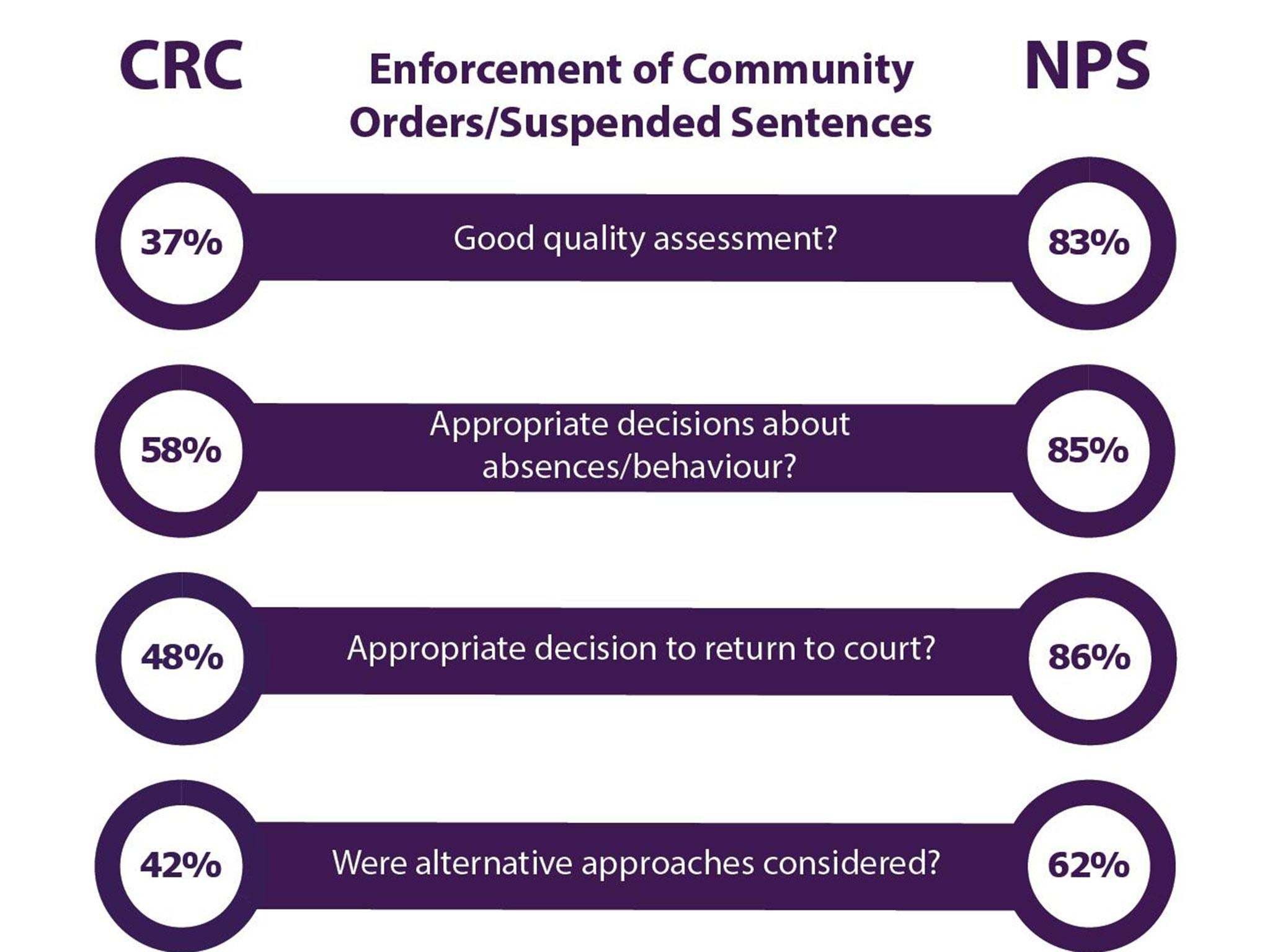
HM Inspectorate of Probation warned that the changes would not be a “magic bullet” for improving performance.
Chief inspector Justin Russell said there were “fundamental flaws” in the original contracts that starved CRCs of funding and affected the quality of their work.
“The probation service must be properly funded,” he added. “The quality of probation supervision will not improve merely by lifting and shifting large volumes of cases from CRCs back into the NPS next year.”
Amid understaffing, he warned that vacancies for probation officers should be filled with properly trained staff.
The Reform campaign group said it would be a “huge challenge” for the NPS to take on the extra work. Its researcher Aidan Shilson-Thomas added: “Previous reforms have been rushed, and the next steps must be taken carefully.
“The government must not make the same mistake of under-investing, which crippled the current model, and avoid over-burdening probation services with unnecessary centralisation.”



